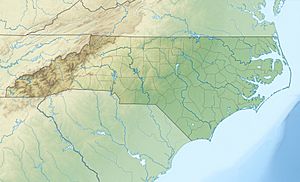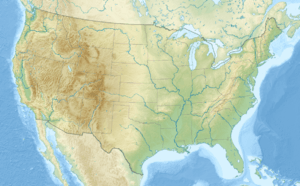Beaverdam Creek (Trent River tributary) facts for kids
Quick facts for kids Beaverdam Creek |
|
|---|---|
|
Location of Beaverdam Creek mouth
|
|
| Other name(s) | Tributary to Trent River |
| Country | United States |
| State | North Carolina |
| County | Jones |
| Physical characteristics | |
| Main source | Bachelor Creek divide about 2.5 miles northwest of Simmons Corner, North Carolina 50 ft (15 m) 35°07′58″N 077°16′04″W / 35.13278°N 77.26778°W |
| River mouth | Trent River about 2 miles northwest of Oak Grove, North Carolina 3 ft (0.91 m) 35°02′50″N 077°16′25″W / 35.04722°N 77.27361°W |
| Length | 6.68 mi (10.75 km) |
| Basin features | |
| Progression | generally south |
| River system | Neuse River |
| Basin size | 7.80 square miles (20.2 km2) |
| Tributaries |
|
| Bridges | Ten Mile Fork Road |
Beaverdam Creek is a cool stream, about 6.68 miles (10.75 km) long. It's like a smaller helper stream that flows into the bigger Trent River. You can find it in Jones County, North Carolina, a county in the state of North Carolina.
Where Does Beaverdam Creek Start and End?
Beaverdam Creek begins its journey in Craven County, North Carolina, near a place called Simmons Corner. It starts about 2 miles northwest of this spot. From there, the creek flows generally south.
As it travels, it crosses into Jones County, North Carolina. Finally, Beaverdam Creek joins the Trent River. This meeting point is about 2 miles northwest of Oak Grove.
What is a Watershed?
A watershed is like a big bowl or area of land where all the rain and snowmelt drain into a common stream, river, or lake. Beaverdam Creek has its own watershed.
Beaverdam Creek's Watershed Facts
The area that drains into Beaverdam Creek is about 6.68 square miles (17.3 square kilometers). This means all the rain that falls in this area eventually makes its way into the creek.
- Rainfall: The area gets a lot of rain, about 53.3 inches (135.4 cm) every year.
- Wetness Index: The creek's watershed has a "wetness index" of 602.73. This number helps scientists understand how wet the soil is and how much water flows into the creek.
- Forests: About 33% of the land in the Beaverdam Creek watershed is covered by forests. These trees are important because they help keep the water clean and provide homes for wildlife.
 | William L. Dawson |
 | W. E. B. Du Bois |
 | Harry Belafonte |



